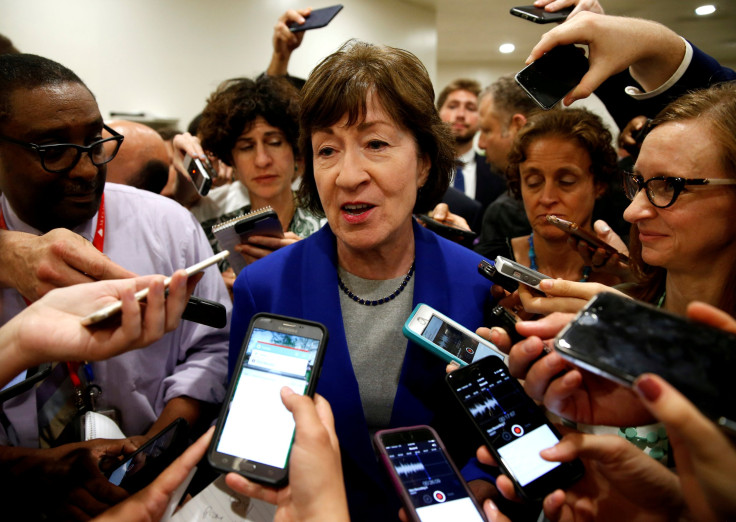What CBO Score On AHCA Could Mean For Future Of Senate Healthcare Bill

Even as the Republican Party hoped to vote on the Better Care Reconciliation Act of 2017 by the end of this week, recent ratings by the non-partisan Congressional Budget Office have estimated 22 million Americans could lose health insurance by 2026 because of the bill. The ratings could prove to be disastrous for the success of Trumpcare, already on the tenterhooks amid opposition from the senators, including the Republican Party members.
The report by the CBO revealed Monday the number of uninsured people would increase to 22 more million more under the current law. The government is also likely to reduce cumulative federal deficits by almost $321 billion over the next 10 years. In the Senate Republican healthcare bill, most of the cuts have been made to the Medicaid plan under which almost 70 million low-income Americans, including two-thirds of nursing home residents, are insured. The report also claimed the average gross premiums would initially rise under the Senate bill, and then drop by about 20 percent by 2026.
Read: Health Care Fight: Senate Bill In Trouble, 2 Senators Seek Bipartisan Effort
The CBO’s ratings of the bill are especially worrisome as they are thought to present the official analysis. Though some Republicans have cast doubts over its accuracy, many set great store by it.
The report comes after Senate Republicans released an updated version of the bill Monday to repeal the Affordable Care Act. This version includes a provision that puts people, whose insurance has lapsed, out of coverage for six months. The CBO projections could further affect the changes made by the Senate leaders to the bill making them cast a decisive vote on the provisions to be included.
The score also helps determine ways in which the bill can be limited to the policies that directly affect federal spending or revenue, according to a report published by the Los Angeles Times. For major reforms like this bill to be analyzed by the CBO, the Congress initially provides them with an outline of the structure and an estimation of the implications. Many drafts of the legislation are then sent over and the CBO gives a formal cost describing the budgetary impact with the final draft. For health legislations, information on premiums and coverage implications is also provided. The bills are re-analyzed when an updated version is released. In an interview with the Atlantic, former CBO Director Doug Holtz-Eakin said: “Congress can waive the CBO score at any time. It gets done differently in every circumstance.”
An analysis of the House version of the bill in March by the same organization said the House GOP plan would increase the number of uninsured by 24 million by 2026. This also triggered a debate over the credibility of the CBO. In a story published in May by the Los Angeles Times, Republicans expressed their doubts over the reports, with Press Secretary Sean Spicer pointing to the CBO’s previous inaccurate projections for Obamacare enrollment :“If you're looking to get a bull’s-eye accurate prediction to where it's going, the CBO was off by more than half last time. The last time they did this, they were wildly off.” The Democrats stood by the agency. "CBO is virtually unassailable," Senate Minority Leader Charles E. Schumer said.
Read: Trumpcare Update: Senate Democrats Protest Republican Healthcare Act For Being Written 'In Secret'
This time too, reactions are pouring in, with the score making many in the Republican Party unsettled over the impact of the bill. Sen. Bill Cassidy (R-Los Angeles) said the CBO score made him “more concerned while Sen. Rand Paul (R-Kentucky) said, “(I) oppose it coming to the floor in its current form, but I remain open to negotiations," according to the New York Times. Meanwhile, Sen. Susan Collins (R-Maine) took to Twitter on Monday evening and said she wanted to work with her colleagues from both parties to fix flaws in the Affordable Care Act but that the budget office’s report showed that the Senate bill could not achieve that .
I want to work w/ my GOP & Dem colleagues to fix the flaws in ACA. CBO analysis shows Senate bill won't do it. I will vote no on mtp. 1/3
— Sen. Susan Collins (@SenatorCollins) June 26, 2017
Among the Democrats, Sen. Chris Murphy (D-Connecticut) tweeted pictures of an impromptu outdoor sit-in on the Capitol steps to oppose the health care legislation late Monday night. He was also joined by Sen. Bob Casey (D-Pennsylvania) and Sen. Cory Booker (D-New Jersey).
I'm w my pal @CoryBooker and lots of others on the Capitol steps holding an impromptu "outdoor sit in" on health care. Crowd is building. pic.twitter.com/FCxIBHqMvI
— Chris Murphy (@ChrisMurphyCT) June 27, 2017
.@SenBobCasey just got here. He's telling the truth about the GOP health care bill. Calls it "obscene". pic.twitter.com/6FajX1f1FG
— Chris Murphy (@ChrisMurphyCT) June 27, 2017
Not just people from the two major parties, but people from the outside have expressed their unhappiness with the bill after the score came out. U.S. Bishops Chairman responded to the score by putting out a statement on Twitter, calling the loss of healthcare to millions because of the bill “unacceptable."
U.S. Bishops Chairman Responds to #CBOSCORE on Senate Health Care Bill: pic.twitter.com/5xueAF2YBt
— U.S. Conference of Catholic Bishops (@USCCB) June 26, 2017
The reactions to the report have left Mitch McConnell of Kentucky, the majority leader, with unpleasant choices. The first option is to change the senators' positions and withdraw the bill while the re-negotiations happen as the Republicans can only afford to lose two votes from their own party to secure the required 51 votes in the Senate. The other choice is to let the bill be defeated. After this setback, it remains to be seen whether the vote would indeed take place before the fourth of July recess .
© Copyright IBTimes 2024. All rights reserved.





















